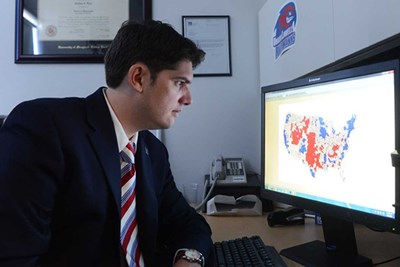The Washington Center Partnership Provides Hands-on Experience, High-level Seminars
 Image by Eric Lee
Image by Eric Lee
02/10/2022
By Katharine Webster
Honors College student and political science major Angela DiLeo was planning to go to law school before she spent the fall semester interning and studying in Washington, D.C., through UMass Lowell’s partnership with The Washington Center for Internships and Academic Seminars.
She interned at the National Association of Federally Impacted Schools (NAFIS), which advocates for more federal aid for public schools on Native American reservations, military bases and other federal lands.
She helped organize the nonprofit’s fall conference, wrote for its weekly newsletter and researched the way similar nonprofits use social media to see how NAFIS could improve its outreach.
She learned time management and professional writing skills – and discovered that she feels ready to join the workforce after she graduates this spring.
“I was surprised to realize that I’d be OK working a 9-to-5 job,” she says. “I made good connections, and I enjoyed myself.”
The connections were so good that DiLeo will return to Washington over spring break to help NAFIS with its spring conference, she says. She may even return after graduation if there is a job opening.
 Image by K. Webster
Image by K. Webster
Wael Kamal, assistant dean of the College of Fine Arts, Humanities and Social Sciences and campus coordinator for The Washington Center (TWC) program, says professional connections are among the main benefits for participants. “Students are able to secure future jobs because of their experience at The Washington Center,” he says.
Students earn 12 credits if they participate during the fall or spring semester and nine credits if they go for the summer. In addition to interning, they take a class and attend a series of professional development workshops.
Generally, a semester at TWC costs about the same as a semester on campus, and financial aid applies, Kamal says. In addition, students who are Massachusetts residents and have a college GPA of 3.0 or higher are eligible for state aid of $6,500, which covers roughly half of the program and housing costs. DiLeo even got a stipend from NAFIS for her internship, further defraying her expenses.
TWC assists with internship matchmaking, but students must apply to and interview for the ones that interest them.
Political science major Ben Souza applied for six internships before he got an offer to work as a research assistant at the National Interest Foundation, a small think tank that analyzes U.S. policy in the Arab world with a focus on social justice and human rights.
It was a perfect fit, drawing on the research skills Souza had learned as a member of UML’s Model United Nations team.
“I asked my supervisor there, ‘Why did you guys hire me?’ and he said, ‘We saw you did the Model U.N., and we thought this was the next step for you,” Souza says.
 Image by Eric Lee
Image by Eric Lee
While Souza researched and wrote policy papers for the foundation, he was also taking a Washington Center class on foreign policy taught by a senior Department of Defense official “who really knew his stuff,” he says. Souza is continuing to work part time for the foundation while he finishes school.
“Going in, I thought, ‘Who wants policy advocacy from a white guy in Massachusetts?’” he says. “But I got nothing but encouraged to work in this field.”
For students unable to commit a semester, TWC offers intensive one- or two-week seminars, including those that revolve around the presidential nominating conventions every four years and the annual Inside Washington Seminar.
Another popular short course is the National Security Seminar, held each May. It’s directed by Assoc. Prof. Neil Shortland of UML’s School of Criminology and Justice Studies, who also leads the university’s Center for Terrorism and Security Studies.
Junior criminal justice major Dean Poulin attended the National Security Seminar online last spring, with financial support from the university that covered half of the $1,500 in tuition. He says he has long aspired to a career in intelligence with the FBI, the CIA or the Department of Homeland Security – but the seminar was like “opening doors.”
 Image by K. Webster
Image by K. Webster
“It made me think about all the people and institutions that go into national security,” he says. “You think of government when you think of antiterrorism, but there are NGOs (nongovernmental organizations) and intergovernmental organizations, too.”
Shortland, who has directed the seminar since 2018, says he schedules three speakers every morning, ranging from former national security advisors and four-star generals to lawyers who protect whistleblowers and defend accused terrorists; from New York Times reporters who’ve investigated U.S. military “black sites” abroad to Facebook executives knowledgeable about online terrorist recruitment.
“Washington is a bubble, and the only way you’re going to understand it is to get inside it,” Shortland says. “There’s no other way these students can hear from so many diverse people in a five- to eight-day span.”
Students go on site visits during the afternoons and meet with their academic leaders, then write a reflective essay each evening on the day’s topic. The National Security Seminar, which was suspended in 2020 and held online last year due to COVID-19 precautions, returns to Washington this May.
Shortland says he tells the 75 students who attend from across the country each year that they may not like every speaker, “but I can guarantee you’re going to hear from one speaker who will change your life.”




